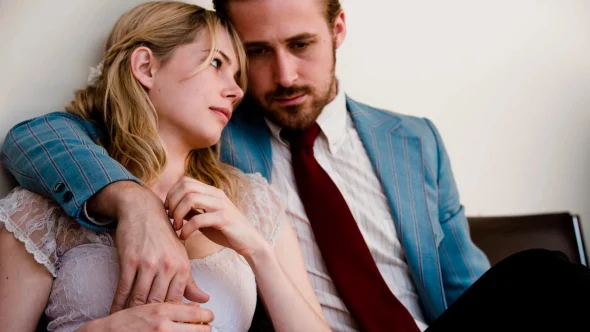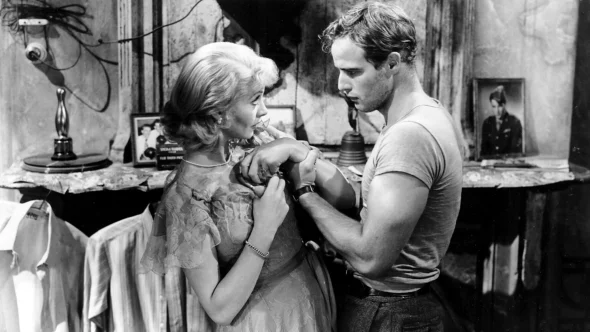
After breaking out on Normal People and then making his film debut in Maggie Gyllenhaal's Oscar-nominated The Lost Daughter, Paul Mescal shot three distinctly unique movies over the course of 2021: The rural Gothic drama God's Creatures, the memoiristic Aftersun, and a modern-day reimagining of Carmen, told through dance. For Aftersun, Mescal received his first Oscar nomination for Best Actor in a Leading Role.
"Without sounding cliché, it is like a dream situation," says the actor. "If I got to draw a map of the films that I want to make and associate myself with, these would be the kind of films that I would make up for myself. So, it feels both really exciting and maybe slightly overwhelming at times, but really, really good."
Mescal began acting at age 16, and only because his primary school mandated that every student audition for the theater productions. He was cast in Phantom of the Opera as the Phantom. "It was a baptism by fire," he remembers. Still, "I fell in love with the process of rehearsing something and building an inner life of another person. And... I don't know. It's like, how do you describe what it's like to fall in love with something? It just was that."
Mescal's map continues to expand in new and exciting ways, with forthcoming turns in Ridley Scott's Gladiator sequel and Richard Linklater's ambitious musical adaptation of Merrily We Roll Along. He views each project "as a challenge to myself, but also to challenge an audience in terms of their perception of me as an actor. To say, 'Hey, I definitely want to subvert any preconceived ideas about what you assume you may or may not get from me as an actor.'"
His latest role is in Andrew Haigh's haunting romantic drama, All of Us Strangers. "I'm really proud of it," Mescal says. He recalls the feeling of wrapping one particularly daunting scene in the film, saying, "It's the best feeling on planet earth. You kind of step away and you feel like you've been hit by a truck at 100 miles an hour and you're somehow intact. You've survived it somehow."
Below, Mescal shares with A.frame the five films that permanently imprinted on his soul.
This article was originally published on Sept. 29, 2022 and has been updated.

Directed by: Derek Cianfrance | Written by: Derek Cianfrance, Joey Curtis and Cami Delavigne
One of the films that I saw in the early days in drama school was Blue Valentine. I didn't have a big film upbringing. I kind of got into it when I was in drama school — I was asking friends what I should watch, and Blue Valentine just happened to be one of the first ones that my friend recommended. I saw it and I was so deeply, profoundly upset by that film. I think it was the first time that I remember, like, truly wanting to switch off from the world for 10, 15, 20 minutes after the film. The performances and also the study of naturalism as a form of acting was so apparent to me in that film that it's stuck with me ever since.

Directed by: James Ivory | Written by: Ruth Prawer Jhabvala
Anthony Hopkins in anything, ever, always is my answer to that. I think it's a study in a particular repression that is reserved for men. There's just something so deeply sad and frustrating about watching Anthony Hopkins' character trying to navigate expressing his feelings. It's such a masterful performance, and one that my dad will watch and quote frequently. "I read books, Miss Kenton, to further my grasp on the English language," and he's holding his hand up to his face — it's so sad!

Directed and Written by: Noah Baumbach
Marriage Story was my favorite film of that year. I like when films allow actors to act, and that's the centerpiece of Marriage Story — these two towering performances. The screenplay is so strong, and the ending is so moving. There's a theme of sadness here. And I think I was sad because it was hopeful. It was like a warm, sad cry.

Directed by: Elia Kazan | Written by: Tennessee Williams
I saw it in that formative drama school period, watching Marlon Brando kind of reinvent the wheel and do something that I don't think had been truly done before. I feel like James Dean started a conversation around naturalism and then Brando ran with it. It's just such a wonderful expression of toxicity in a way that is alluring and exciting to watch.
[In the West End revival of 'A Streetcar Named Desire,' Mescal starred as Stanley Kowalski, the role Brando played in the original 1947 Broadway production and the 1951 film. He won the Laurence Olivier Award for Best Actor for the portrayal.]
I feel honored to play a part that is so brilliantly written. Obviously, I feel frightened. I'm really trying to unremember and remember the parts of Brando's performance, as to not copy or even attempt to emulate it, but to remember what about his performance aligned with what I feel when I read the script. It's always fun to work on your favorite play, and it's a classic for a reason.

Directed by: László Nemes | Written by: László Nemes and Clara Royer
It's my favorite film of the last 10 years. László Nemes is a wonderful director, and I recently got to work with the DP who shot Son of Saul [Mátyás Erdély]. It's just a masterpiece. It's a super-talented actor meets director meets DP, which only can happen in film. A different kind of alchemy happens on stage. But after the first 10 minutes of that, I remember my jaw being on the ground and being like, "This is a masterpiece." And, trigger warning. It's a Holocaust film that is pretty brutal. It's really upsetting.







